Studies & Degrees in Econometrics
Choose where you would like to study Econometrics:
Czech RepublicIndiaNetherlandsRussiaSpainThe United KingdomThe United StatesEconometrics Study Programs
Econometrics is a very challenging discipline, which combines the study of economics with mathematics to analyze information; mathematical models are employed to explore various scenarios and theoretical situations.
Econometrics is used in a great number of situations, and for example banks and governments adopt econometric models to help them make changes in interest rates or wages. With this in mind, an econometrician could help the government with monetary policies, taxation, expenditure, budget controls, and give predictions on how these would affect the economy in the future. Econometricians can also provide management with various analysis and forecasts, or study issues like the effect of industrial disputes on the economy.
Personal Qualities
A natural feel for mathematics and economics is a good personal attribute that can help you with such a degree. A further list of qualities includes:
- Logical and analytical thought
- Ability to carry out research and present results in a clear and concise way
- Good at statistics analysis
- Convey ideas to different audiences
Study Options
If you wish to become an econometrician or an economist, you should definitely gain a bachelor’s degree, together with some research experience and an internship, and possibly explore options for a post-graduate degree as well.
Subjects you should focus on in high school are mathematics, statistics, and economics, as both undergraduate and postgraduate degree options would be looking for high performance in these areas. You could also consider undertaking a degree in economics or business, with a focus on econometrics. If you are physicist or an engineer, your skills are also easily transferrable to a study program in econometrics and related fields.
Career Options
Econometricians who have just graduated often start their careers as junior analysts or statisticians, as for these jobs they would need to apply the same forecasting, regression analysis, and stochastic tools.
The demand for econometricians in financial firms is constantly on the rise, because these companies aim at building stronger credit and risk-management programs, for which job they require quantitative analysts. There are the more traditional jobs of forecasting prices of financial assets, too, which are open to entry-level candidates.
As discussed earlier, you could also be hired to work in government, where forecasts and historical data provided by such professionals support future decisions on minimum wage levels, interest rates, and so on. Furthermore, governments and government agencies often target economic students who want to be involved in econometrics and forecasting, which means you could start researching such opportunities early in your career, or even do a summer internship.
Finally, if you decide to go further with your education and earn a PhD, academia and consulting are career options you might wish to pursue.


